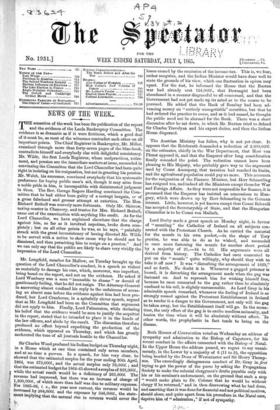Sir Charles Wood produced his Indian budget on Thursday night,
in a House which at one time contained only seven members, and at no time a quorum. In a speech, for him very clear, he showed that the estimated surplus for the year ending 30th April, 1864, was 275,000/., and the actual surplus only 78,0001.; and that the estimated budget for 1864-65 showed a surplus of 823,000/., i)* while the actual result would be a deficiency of 263,000/. The revenue had improved, but there was an increase of charge of 1,200,000/., of which more than half was due to military expenses. For 1865-66, i. e., the year now current, the revenue would be
_ increased by 264,000/. and the expenses by 346,000/., the state- ment implying that the natural rise in revemre would cover the losses caused by the remission of the income-tax. This is, we fear, rather sanguine, and the Indian Minister would have done well to state the grounds of his view, which one fluctuation in opium may upset. For the test, he informed the House that the Bootan war had already cost 164,0001., that Dewangiri had been abandoned in a manner disgraceful to all concerned, and that the Government had not yet made up its mind as to the course to be. pursued. He added that the Bank of Bombay had been ad- vancing money on "entirely unnegotiable" securities, but that he had ordered the practice to cease, and as it had ceased, he thought the public need not be alarmed for the Bank. There was a short discussion after he sat down, in which Mr. Buxton tried to defend Sir Charles Trevelyan and his export duties, and then the listless. House dispersed.






























